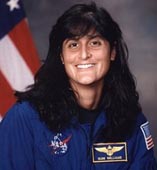Sunita Tests LOCAD-PTS
With the purpose of extending future exploratory journeys into space, the first major test on the Space Station is successfully completed by LOCAD-PTS. LOCAD-PTS (Lab-On-a-Chip Application Development-Portable Test System) is a miniature biological laboratory which was launched December 9, 2006 and Saturday, March 31, 2007, was it’s scheduled to be opened.
of extending future exploratory journeys into space, the first major test on the Space Station is successfully completed by LOCAD-PTS. LOCAD-PTS (Lab-On-a-Chip Application Development-Portable Test System) is a miniature biological laboratory which was launched December 9, 2006 and Saturday, March 31, 2007, was it’s scheduled to be opened.
Sunita Williams, an astronaut from US, assembled the LOCAD-PTS parts. Among several readings taken by her, the first two reading were used to confirm that the instrument was functioning accurately. She also took readings of various objects in the region of the cabin that were expected to have bacteria. The instrument showed a strong positive reading that bacteria were being detected, and negative readings were shown by ultra-clean water samples.
It took more time to analyze the nearly pure water as compared to analyzing dirtier things because cleaner the samples, the longer it took LOCAD-PTS to examine.
The LOCAD-PTS device has a great significance for space travelers take long journeys into space like the mission to the planet Mars. This hand held device has the ability to rapidly detect the presence of biological and chemical substances such as bacteria or fungi on the surfaces of a spacecraft, such as humans, electronics, and structural materials.
Astronauts need to just mop surfaces, and insert that material to the LOCAD-PTS, and within 15 minutes receive a result on a display screen. The samples will not be required to send back to the Earth for any further analysis.
The LOCAD-PTS method is expected to be tested against various common culture methods during next few months to compare it with other methods of detecting and analyzing bacteria.
Future sophisticated versions of LOCAD-PTS will be able to detect hydrazine, ammonia, and other chemical substances that are harmful for astronauts and blood, saliva, and urine proteins.